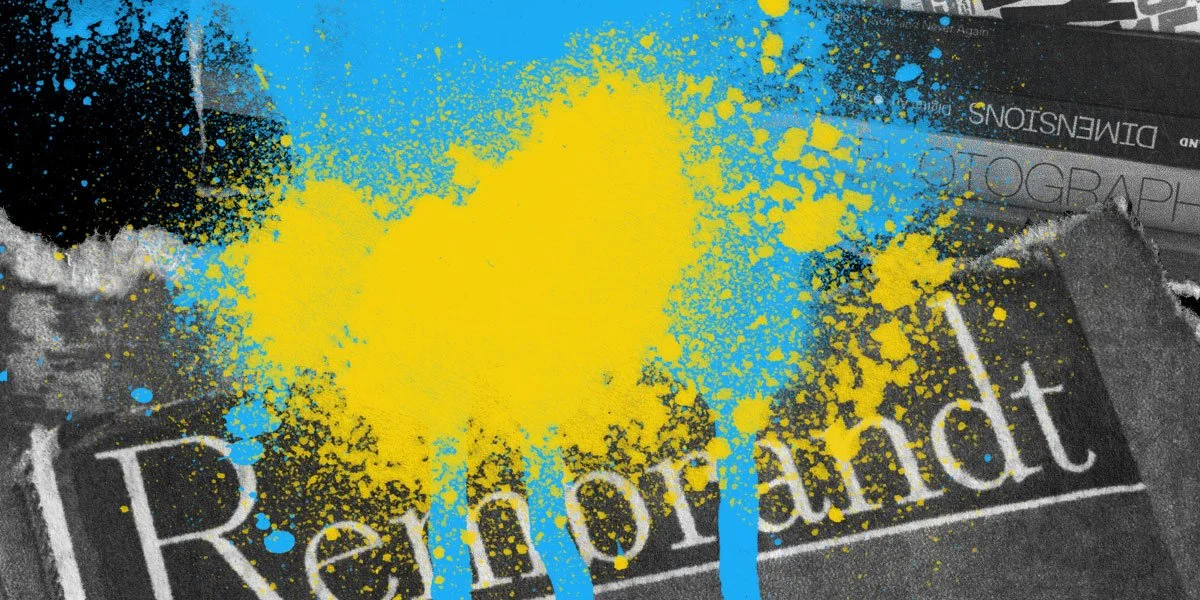THE HOCKNEY SOLDIER
The Picture Book was pivotal. It showed up one quiet afternoon in the art and design section of the bookshop in which I worked after graduating from my illustration degree course.
I was floundering without tutors, or studio space, or peers at the time. Books kept me going. Whenever the shop was quiet, I engineered undisputable reasons to hover near the art books, and the red hand lettering - daubed on the grey front cover of The Picture Book – drew me in like a moth to a flame. I couldn’t handle how well it worked; how easy the lettering had been made to look despite knowing it was the trick of simplicity. Something about that naivety spoke to a part of my soul that I could not yet understand or utilise consciously. That’s what these books do. Scatter crumbs on the ground for us to follow.
Within five minutes, with that succulent staff discount, I’d burned a little more of my overdraft in the latest attempt to jump-start my flatlined career ambitions.
Everything changed when I ran home and spilled its guts without even taking my shoes off. Hundreds of pages, action-packed with the glorious work of the hottest illustrators of the day slopped down my trousers and onto the carpet. I still lacked any sense of how I’d start to get into this creative industry but, I’d peeked into Galadriel’s mirror, and saw this one possible future, and there was no turning back.
Books were ever-present. From the very first day of my arts education, when I walked into college with a book of Yoji Shinkawa’s Metal Gear Solid video game art, (much to the chagrin of my tutor). During our studies and beyond, one by one, on a naïve, wondrous loop, us wannabe illustrators and designers and artists would all come back from the university library, or ‘Magma’ bookshop in Manchester with thick volumes like The Picture Book, and leave them in prominent places; on coffee tables, on our studio desks, on café tables for all to see what we were. Where we were going. To what we belonged. Even if we didn’t open them, they were there.
The mere presence of an art book was enough to stoke our fires.
Magma specialised in art and design books and pilgrimages to it, on the train from our university town, Preston – 50 minutes or so – just to browse, were sacred, and filled our heads with artistic imaginings of colossal proportions; an all-you-can-eat buffet for the unconscious that we hoped might hurry up and re-emerge as something half-decent. If we had a part-time job or student loan money, we’d choose a succinctly produced design journal, sketchbook anthology, quirky font treasury, an indie zine riddled with irresistibly droll comic strips by Tom Gauld, or abstract photography and frenzied doodles.
I remember one story in a visitor lecture about artist books. About a guy who’d got a book deal for a box of Polaroids they’d found in the home of an elderly lady who had passed away. In her twilight years, this lady would leave the house, make it only so far, and realise she couldn’t be sure whether she’d turned off her gas cooker hobs, and have to make the return journey to check. It was driving her mad, so she started to shoot polaroids of the dials and keep the evidence right there in her pocket. Then the big twist: it was all bullshit. Just a wild idea presented as a real event. That made it even better for me.
Anyway, you get the idea. These books were nothing short of prophecies containing glimpses of our wildest creative fantasies. They were pure and transcended all of the grey goo down here; all the banality that polluted and barricaded our utopian desires; the utility bills and the routine operations and the leaking rooves and the supermarket trolleys and the pet insurance ropes around our wings.
Ask anyone.
They’ll tell you.
I wouldn’t be stretching if I told you these were the porn magazines left under my professional hedge.
I even got in one once. A European anthology of illustrators. Not a porno.
These books belonged to us in a way that nobody else could ever know; not even the others who owned the exact same book. Nobody ever dog-eared that same page for the same reasons.
When my career finally did get started, every new shithole studio I illustrated out of, the books were the crowning glory. They became my industry membership card.
Every agency I haunted the receptions of sipping my coffee, they had a stack of books or mags, and I’d make sure I was lost in one, brow furrowed, lurched forward as if I’d stumbled across the meaning of life when the creative director arrived to look at myy portfolio, hissing apologies for their lateness. If I stared at the pages hard enough, they’d know I was serious.
Never, ever, in the presence of these books did I think about saying goodbye to them.
And then I learned about The Hockney Soldier.
I’d talked to Olya.
Olya was a Ukrainian illustrator.
And designer.
Design activist.
Olya knew the meaning of war.
That was the Ukrainian reality.
It had been this way for centuries.
What that meant to too many of us from other places was a disconnect.
Their war was here and now. Our world, our time. But without knowing what it felt like to hear the first wail of an air alert – to have the spirit shaken by rockets and bombs as they edited, or deleted your street and childhood home; to know the smell of a sinking ship; to know how it felt to claw at rubble and dust with shaking, bare hands until the skin gave way, and to try desperately to locate a whine or a groan; or worse: to fight to stay in control as the grotesque silence of an absent reply from underneath paralyses the mind – it was all too easy to ‘send positive thoughts’ and get on with what we were doing. For us the idea of war was filed alongside Granddad’s stories.
But when Olya sent me the photo of the books, there was no hiding place.
It mirrored the contents of the bookshelves behind me.
There were art books. Design books. Books on the nude figure.
There was Helmut Newton. Juxtapoz. Rembrandt.
And there was Hockney.
David Hockney.
From Bradford.
Just up the road from the Yorkshire mill town of Keighley where I grew up free of the shadow of war.
I knew, thanks to an adult life spent hauling them around, that these piles of anthologies and compendiums and collections and expressions of the personal shape of creativity, were so heavy that if you filled a box and tried to lift it, you’d just be left holding the handles. But they were mere dust motes under the crushing gravity of their owner’s story.
What brought this photograph into my life was my will to help the Ukrainian people in some small way.
The bravery they’d shown me transcended linguistic limitations. These people continued to create despite all that human darkness seeping into their land, and their lives, coming for their language and culture and right to exist as free people.
That’s how all this had started.
Olya and I.
Creativity was our bond.
She’d heard about Stefan Sagmeister’s book Now is Better on my podcast and now, thanks to the efforts of her and the Ukrainian creative community, it was available in their bookshops.
And I just had to hear that story.
Hear why books and making art still mattered. I had my assumptions about what the reasons might be, but only the people who had to walk past anti-tank hedgehogs in the street truly knew. So Olya and I arranged a call.
Making art had mattered to The Hockney Soldier. The cityscape of books they’d sold to the book shop, and dropped off in massive bags proved that.
I almost hadn’t asked Olya the obvious question during our chat. How could I?
But I did because, in the face of this courage and triumph of the human spirit, I couldn’t tuck my tail and skirt around the reality of it.
‘Even now,’ I asked her, ‘given everything the Ukrainian people have had to suffer, can now possibly be better?’
And Olya had told me about her grandmother who had to live through Holodomor. Holodomor, where so many had died of artificial starvation. At a time when journalists had tried to get news out to countries who might challenge the barbarism, but nobody had listened.
So yes, she told me, we can share information and we have support, so to this point, now is better.
And words failed me as my brain scrambled for something to respond with that wasn’t a silly noise.
After Olya sent me the photo I couldn’t stop looking at the books.
My books, which I’d never see in the same way again.
And their books.
The Hockney Soldier.
I named them that because this person was going to fight in the war and these piles of books - which were just like my piles of books - said they knew they might not be returning.
Those fingers that had turned those pages and bookmarked points of reference, and had maybe made keyboard shortcuts in Photoshop, or gently applied brushstrokes to a canvas would now have to grasp the chilling steel of a gun, and fiddle with the chin-strap of a helmet.
And as I look at the books over and over, I want to press my fingers against theirs, because this person is bound to me and I to them. Not through Hockney. Not even through the books. Not through the rules of typography or a south-facing studio space with good daylight, but through creativity. Imagination. That magical part of the human condition, and the bedrock of the cognitive revolution that had fooled us into thinking we were separate from the animal kingdom, but did put us at the summit of it. And now the Hockney Soldier had to walk away from these compendiums of the best of humanity to face the destruction and devastation of its drooling worst, the savagery that made me wonder if we were actually beneath it.
But the books gave me hope. I hoped beyond all hope that The Hockney Soldier would come home to a free land, where the new seeds of culture could blossom like never before, and the sun would look so bright, and every colour would burst from every page in colours we’d never seen before.
And these books were too much for me to bear.
But it didn’t end there.
Olya had told me that when things were bad, people had a way of behaving like bees or ants, of not waiting to be told what to do, and adapting.
I offered to buy some of the books, to keep them safe, to be returned if The Hockney Soldier returned home. But I was beaten to it. By some distance, and it felt good. They had sold almost immediately. And their hosts, just like me, knew that this was a loan. Whatever happened, it was a loan. They would house them, because the books are refugees too, with a story of their own, the ending of which none of us can know.
An ending that somehow, we could all influence.
Photography courtesy of the Ukrainian Institute
Illustration by Ben Tallon



